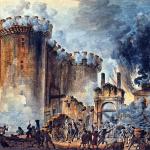A study sponsored by the British government has found that religious persecution around the world is taking place on a scale and intensity that few people have realized.
According to the report, “one third of the world’s population suffers from religious persecution in some form, with Christians being the most persecuted group.” Moreover, the report concludes, “In some regions, the level and nature of persecution is arguably coming close to meeting the international definition of genocide.”
The biggest offenders are in the Middle East (Saudi Arabia, Iran, Iraq, Qatar), Northern Africa (Egypt, Libya), Sub-Saharan Africa (Nigeria, Kenya, Sudan, Eritrea), East Asia (China, North Korea, Laos, Vietnam), Central Asia (Afghanistan, the former Soviet states of Kazakhstan and Tajikistan), and Southern Asia (India, Pakistan, Sri Lanka).
The persecution, according to the report, is coming from militant Islam, radical Buddhists and Hindus, Communism, nationalism, and other types of authoritarian governments.
Read the Interim Report. It documents the situation in the different parts of the world and breaks down the different kinds of persecution, including those with the express purpose of eliminating Christianity “by the sword”:
Violent persecution exists in many forms. Firstly there is mass violence which regularly expresses itself through the bombing of churches, as has been the case in countries such as Egypt39, Pakistan40 and Indonesia41 . . . .
Extrajudicial killings and the enforced and involuntary disappearance of Christians are also widespread. . . .
‘Militant vigilante groups’ which ‘patrol their neighbourhoods’ looking for those who do not conform to society’s religious norms also pose a violent threat53 to Christians in India. . . .
Social persecution is often structural in nature and harder to detect, but is the type of persecution which the majority of persecuted Christians are experiencing because it is so far reaching in every area of life.56 For instance, the private lives of Christians are closely regulated in the DPRK57 [North Korea] with widespread state propaganda attempting to regulate the thought lives of its citizens.58 In countries such as Saudi Arabia59 and the Maldives60 citizens are not entitled to hold Christian meetings even in the privacy of their own homes. In countries such as Uzbekistan61, Turkmenistan62, Tajikistan63 and Kazakhstan64 the churches are tightly regulated with the freedom of religion and belief severely inhibited as churches are regularly raided. In both China65 and Tajikistan66 reports of churches being forced to turn minors away from services continues to undermine the right67 of parents to pass on their religion to their children.68
The suppression of public expressions of Christianity is further curbed through discriminatory behaviour and harassment by bureaucratic means. . . .
Finally, the situation within the ‘national sphere’ highlights the way in which Christians experience laws which are detrimental to their international right to freedom of religion or belief.
British Foreign Secretary Jeremy Hunt, who commissioned the study, told BBC that the report, which was released around the same time as the church bombings in Sri Lanka, had “woken everyone up with an enormous shock.”
But why does this information seem such a big surprise? Why hasn’t the Western media been covering this story? Mr. Hunt, in effect, blames political correctness. From Christian persecution ‘at near genocide levels’, BBC:
“I think there is a misplaced worry that it is somehow colonialist to talk about a religion that was associated with colonial powers rather than the countries that we marched into as colonisers. That has perhaps created an awkwardness in talking about this issue – the role of missionaries was always a controversial one and that has, I think, also led some people to shy away from this topic. What we have forgotten in that atmosphere of political correctness is actually the Christians that are being persecuted are some of the poorest people on the planet.”
But Islam was spread “by the sword” from its very beginnings! And the Christians who have been experiencing some of the most violent persecution today are in the Middle East and Northern Africa, where the churches were not started by Western missionaries at all! Those ancient churches were the homeland of Christianity–which started, of course, in present-day Israel–which then spread throughout the Roman Empire. (St. John Chrystostom was from Antioch, in present-day Turkey; St. Athanasius was from Egypt; St. Augustine was from Carthage in present-day Libya). Those churches were then subjugated by Islamic conquests.
As for Western missionaries, they spread the Christian faith not by force, as Islam did, but by proclaiming the Gospel, which they accompanied with works of mercy. This pattern continues today. A friend of mine from Nigeria said that when the Christian missionaries came, they started schools and hospitals. When the Muslims came, they took over the governments.
At any rate, this report concentrates on overt persecution, not the much more minor disapprovals and discriminations that sometimes occur in Europe, the United States, and other developed countries. But we can see the contours of such persecution even in the “free countries.” Anti-discrimination laws that prevent people from expressing what their religion teaches about sexual morality would fall under the category of laws that restrict religion. So would laws in Europe and Canada that prohibit the wearing of religious clothing and symbols. These target the Islamic dress code for women, though they also limit the wearing of crosses and other Christian symbols, and they are clear violations of religious liberty. As for “social persecution,” this is also commonplace, though it happens informally in certain social circles, but these include academia, the media, and other influential spheres.
Ironically, though, it is in times of persecution when the church really comes alive, when it is at its purest and strongest, when it starts growing and winning over its persecutors. The bearing of the Cross can be horrible, but it is a sign of victory.
Photo: Samuel and Bishoy Stephanos, Coptic Christians, immediately before their beheading by ISIS with 19 others, via Phillip K, Flickr, Public Domain.,













